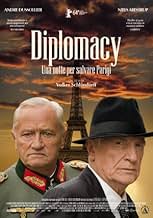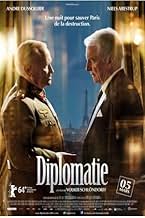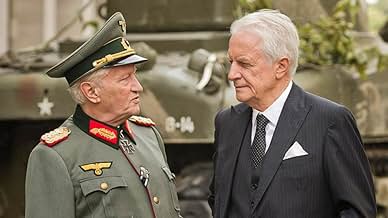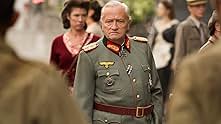AVALIAÇÃO DA IMDb
7,1/10
6,1 mil
SUA AVALIAÇÃO
Adicionar um enredo no seu idiomaA historical drama that depicts the relationship between Dietrich von Choltitz, the German military governor of occupied Paris, and Swedish consul-general Raoul Nordling.A historical drama that depicts the relationship between Dietrich von Choltitz, the German military governor of occupied Paris, and Swedish consul-general Raoul Nordling.A historical drama that depicts the relationship between Dietrich von Choltitz, the German military governor of occupied Paris, and Swedish consul-general Raoul Nordling.
- Direção
- Roteiristas
- Artistas
- Prêmios
- 5 vitórias e 6 indicações no total
Pierre-Marie Rochefort-Schneider
- Opérateur radio
- (as Pierre-Marie Rochefort)
Avaliações em destaque
Cyril Gély's play 'Diplomatie' opened at the Théatre de la Madeleine in 2011 with Niels Arestrup as Dietrich von Choltitz and André Dusollier as Raoul Nordling. It ran for three hundred performances so both actors certainly had long enough to get it right! Although the ways of Film are mysterious, when it came time to adapt the piece for the screen they were obvious choices and luckily for us they were able to reprise their roles.
The relationship between the characters of von Choltitz, Governor-General of occupied Paris and Swedish consul Nordling had been touched upon in René Clément's sprawling and star-studded epic 'Is Paris burning?' in which they were played by Gert Frobe and Orson Welles. They met on several occasions but for the dramatic purposes of the play Gély depicts one fictional meeting that takes place in the L'Hotel Meurice on the Rue de Rivoli just hours before von Choltitz is due to carry out Hitler's order to destroy Paris rather than let it to fall into the hands of the advancing Allies.
Here, as opposed to the earlier film, the emphasis is on individual rather than collective action. The means by which Nordling allegedly convinces the hard-nosed and brutal General to rescind Hitler's maniacal order are of course purely hypothetical but results in excellent theatre. Presumably Gély had access to the General's memoirs but how reliable are these one wonders? There are some who have suggested that von Choltitz is merely motivated by the desire to save his own skin, knowing that his previous military actions in Rotterdam and Sevastopol would mark him out as a war criminal(in fact he only served two years in prison) and that anyway, he lacked sufficient time and resources to carry out the order effectively. What is plausible and very much in keeping with the characters is that Nordling promises to get von Choltitz' wife and children out of Germany and into safety in Switzerland if he surrenders the city. It is known than Choltitz had previously refused to obey Himmler's order to ransack the Louvre so already the seeds of defiance were being sewn and like so many officers of the Wehrmacht he had serious doubts about Hitler's sanity. Perhaps after all Nordling wasn't required to do too much persuading.
As for the film Volker Schloendorff has done a marvellous job in sustaining our interest in what is essentially a two-hander. The camerawork of Michel Amathieu is excellent and although shot in colour the contrasts between light and dark aid the drama immeasurably. The director mainly keeps the action within the proscenium arch but a filmically effective scene is where von Choltitz rescinds the order whilst on the roof of the hotel so that both he and the audience have the panorama of Paris in view.
Schloendorff has achieved a perfect balance here between film and filmed theatre and has the advantage in Arestrup and Dusollier of two consummate professionals at the top of their game.
Seventy-five years on it is difficult to appreciate just how close Paris came to destruction. One would dearly love to believe that Nordling's arguments won the day as it gives us a feeling that maybe, just maybe, 'the strength of one in tongue and speech is mightier than all fighting.' We live in hopes!
The relationship between the characters of von Choltitz, Governor-General of occupied Paris and Swedish consul Nordling had been touched upon in René Clément's sprawling and star-studded epic 'Is Paris burning?' in which they were played by Gert Frobe and Orson Welles. They met on several occasions but for the dramatic purposes of the play Gély depicts one fictional meeting that takes place in the L'Hotel Meurice on the Rue de Rivoli just hours before von Choltitz is due to carry out Hitler's order to destroy Paris rather than let it to fall into the hands of the advancing Allies.
Here, as opposed to the earlier film, the emphasis is on individual rather than collective action. The means by which Nordling allegedly convinces the hard-nosed and brutal General to rescind Hitler's maniacal order are of course purely hypothetical but results in excellent theatre. Presumably Gély had access to the General's memoirs but how reliable are these one wonders? There are some who have suggested that von Choltitz is merely motivated by the desire to save his own skin, knowing that his previous military actions in Rotterdam and Sevastopol would mark him out as a war criminal(in fact he only served two years in prison) and that anyway, he lacked sufficient time and resources to carry out the order effectively. What is plausible and very much in keeping with the characters is that Nordling promises to get von Choltitz' wife and children out of Germany and into safety in Switzerland if he surrenders the city. It is known than Choltitz had previously refused to obey Himmler's order to ransack the Louvre so already the seeds of defiance were being sewn and like so many officers of the Wehrmacht he had serious doubts about Hitler's sanity. Perhaps after all Nordling wasn't required to do too much persuading.
As for the film Volker Schloendorff has done a marvellous job in sustaining our interest in what is essentially a two-hander. The camerawork of Michel Amathieu is excellent and although shot in colour the contrasts between light and dark aid the drama immeasurably. The director mainly keeps the action within the proscenium arch but a filmically effective scene is where von Choltitz rescinds the order whilst on the roof of the hotel so that both he and the audience have the panorama of Paris in view.
Schloendorff has achieved a perfect balance here between film and filmed theatre and has the advantage in Arestrup and Dusollier of two consummate professionals at the top of their game.
Seventy-five years on it is difficult to appreciate just how close Paris came to destruction. One would dearly love to believe that Nordling's arguments won the day as it gives us a feeling that maybe, just maybe, 'the strength of one in tongue and speech is mightier than all fighting.' We live in hopes!
When Hitler's army was on the verge of withdrawal from Paris, they were ordered to destroy all major structures, such as Louvre, Eiffel Tower et al and to pulverize the city. We all know that the city still stands with all its monuments. It is the story of that fateful night when the destiny of a city hung in balance.
The acting is great. The run time is super short (75 minutes). The twists are many. The dialogues are sharp. The debates between the two principals are thought provoking and force you to empathize.
Highly recommended. Well made.
The acting is great. The run time is super short (75 minutes). The twists are many. The dialogues are sharp. The debates between the two principals are thought provoking and force you to empathize.
Highly recommended. Well made.
My wife and I went to see this film a few days ago, I loved it. Excellent acting! I find the title, "Diplomatie" to fit in very well with the observation that the Swedish diplomat clearly had no intention whatever to honour his promises to the German general (i.e. to take care of his family in mortal danger of suppression by the Nazi establishment). In other words, my reading is that diplomatic practice apparently provides the practitioner of that particular political act the green light to do whatever he deems necessary to reach the objective of the "raison d'état", not excluding playing on emotions or even outright lying. Not a pretty observation. Is it correct? Neither am I convinced the film is to be taken as historically correct: the decision not to destroy Paris was the result of a balanced appraisal of the fact that it was not the communists (resistance) that liberated Paris, but ...Spanish... troops in the service of General De Gaulle executing an agenda not quite in line with American instructions. Comme quoi History is often written with a small "h".
This is a brilliant film.
Masterfully set in the tense historical and ideally theatrical moment, the story demonstrated that the combination of the power of the iron will and the eloquent linguistic skills, both built on the trust of the two human beings, was able to defy something impossible.
From the linguistic point of view, the film was made very realistic, switching between German and French. This is a relief, given a flood of supposedly European movies of recent with a way too many English speaking characters.
I want my children to watch this film to eyewitness the history and perhaps something more important than that: Words, not the sword, saved Paris and her people from calamity.
Masterfully set in the tense historical and ideally theatrical moment, the story demonstrated that the combination of the power of the iron will and the eloquent linguistic skills, both built on the trust of the two human beings, was able to defy something impossible.
From the linguistic point of view, the film was made very realistic, switching between German and French. This is a relief, given a flood of supposedly European movies of recent with a way too many English speaking characters.
I want my children to watch this film to eyewitness the history and perhaps something more important than that: Words, not the sword, saved Paris and her people from calamity.
I enjoyed this film very much! First of all it is a very interesting recreation of a stage play into a film. Plot is interesting well enough since the subject is of a great interest to the general public, one night in August of 1944 when general in command of Paris had to decide should he follow Hitlers orders and blow up Paris or to surrender without doing it. He made good decision, we should be grateful that he had piece of sanity left not to blindly follow those orders.
Acting is excellent by both principal actors, and other actors as well.
If you are a World War II buff this is a must see for you, but I strongly recommend that you see this film anyways, because it is just short of a masterpiece.
Acting is excellent by both principal actors, and other actors as well.
If you are a World War II buff this is a must see for you, but I strongly recommend that you see this film anyways, because it is just short of a masterpiece.
Você sabia?
- Citações
Général von Choltitz: Do you know what we do to men like you?
Raoul Nordling: Give them a medal?
Général von Choltitz: [breaking a smile] Yes, on occasion.
[stern again]
Général von Choltitz: Posthumously.
- ConexõesFeatured in Diplomatie: Making of (2015)
- Trilhas sonorasLa 7ème symphonie
Music by Ludwig van Beethoven (as Beethoven)
Conducted by Wilhelm Furtwängler
Berlin 1943 © Société Wilhelm Furtwängler
Performed by Berliner Philharmoniker (uncredited)
Principais escolhas
Faça login para avaliar e ver a lista de recomendações personalizadas
- How long is Diplomacy?Fornecido pela Alexa
Detalhes
- Data de lançamento
- Países de origem
- Central de atendimento oficial
- Idiomas
- Também conhecido como
- Diplomacy
- Locações de filme
- Jardin des Tuileries, Paris 1, Paris, França(city park in front of the hotel)
- Empresas de produção
- Consulte mais créditos da empresa na IMDbPro
Bilheteria
- Faturamento bruto nos EUA e Canadá
- US$ 230.880
- Fim de semana de estreia nos EUA e Canadá
- US$ 8.518
- 19 de out. de 2014
- Faturamento bruto mundial
- US$ 4.207.242
- Tempo de duração
- 1 h 24 min(84 min)
- Cor
- Mixagem de som
- Proporção
- 2.35 : 1
Contribua para esta página
Sugerir uma alteração ou adicionar conteúdo ausente
















